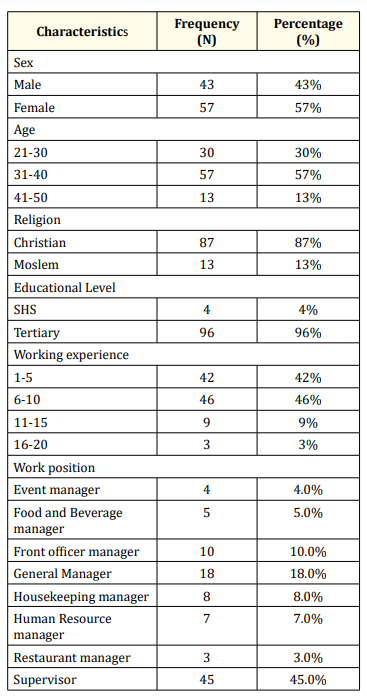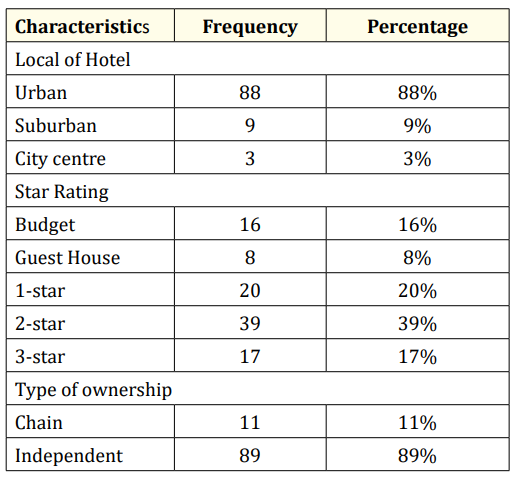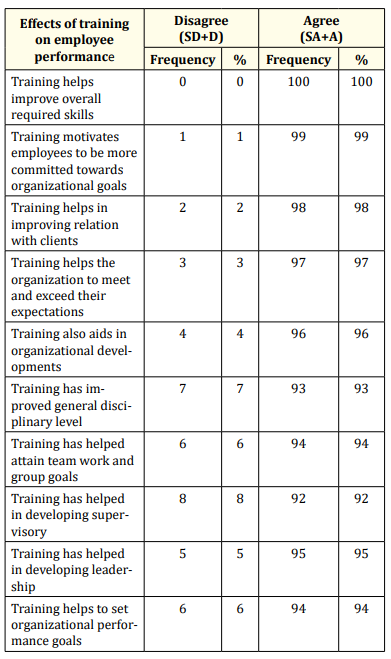Armah-Ansah* and Quartey Rita
Department of Population and Heath, University of Cape Coast, Ghana
*Corresponding Author: Armah-Ansah, Department of Population and Heath, University of Cape Coast, Ghana.
Received: April 27, 2019; Published: June 12, 2019
Citation: Armah-Ansah and Quartey Rita. “Effects of Training on Employee Performance in Ga East Hotels ”. Acta Scientific Paediatrics 2.7 (2019):02-07.
Employees are major asset of any organization since they play a major role towards a company’s success. The accomplishment or disaster of a hotel depends on its employee performance. As a result, equipping these unique assets through effective training becomes imperative in order to maximize the job performance and also position them to take on the challenges of today’s competitive business climate. This study sought to examined the effect of training on employee performance in some selected hotels in the Ga East Municipal Assembly, Accra Ghana. Data was collected among selected hotel employees in the Municipality. Questionnaires were administered among 100 randomly selected respondents. The data was analyzed with Statistical Product and Service Solution (SPSS) software version 21 and presented using tables.
The study revealed that most of the hotels in Ga East Municipality are in urban centre, 2-star and majority of them are independently owned. The three most popular method of training were orientation (99%), demonstration and examples (63%), and mentoring (44%). Also, 100% of the respondents believe that hotels employees are trained to communicate effectively to the customers, 98% believe that hotel employees should show the services offered to guest and 98% also believe that hotels should monitor use of its resources. One hundred percent of the respondents revealed that training helps to improvement the overall skills of employees.
In conclusion, respondents believe that orientation is key as well as demonstration and examples since it will help communicate effectively to customer and also help improve their own skills and relationship with clients.
Keywords: Employee; Hotels; Organization
The hospitality industry, from which hotels are a main part, is service intensive and consequently relies heavily on its human resources [1]. The hospitality industry is one of the oldest industries in the world, the fastest growing sector of the economy and a multi-billion dollar growing enterprise [2]. For a whole hotel to operate smoothly, it needs the involvement of staff of all departments: from the departments directly dealing with guests like Front Office, Housekeeping, Food and Beverages to back-office departments such as Accounting or Engineering [1]. Ghana’s hotels contribution to the Gross Domestic Product (GDP) for the third quarter of 2012 grew by 31.8% [3]. This indicates the significance of the hospitality industry towards the overall growth of the country’s economy and has long been recognized that tourism and hospitality have an impact on economic activity [4].
Improved capabilities, knowledge and skills of the talented employees proved to be a major source of competitive advantage in a global market [5]. Employees are major asset of any organisation since they play an active role towards a company’s success [6]. As a result, equipping these unique assets through effective training becomes imperative in order to maximise the job performance and also position them to take on the challenges of today’s competitive business climate [7]. Perhaps, the most effective way to develop employees is to give them training in their respective fields [8] and training has the distinct role in the achievement of an organizational goal by incorporating the interests of organisation and the workforce [7].
The fundamental aim of training is to help an organization to achieve its goal by adding value to its key resources, employees [9]. In an ever-growing competitive world, where organizations are always at competition with one another in terms of goods and services, there should be a link between the organizations business strategy and the training and development that it undertakes [8].
ways at competition with one another in terms of goods and services, there should be a link between the organizations business strategy and the training and development that it undertakes [8].
Managers are trying their level best to develop the employee’s capabilities, ultimately creating good working environment within the organization [10]. Training is an essential aspect of human resources management which must be embarked upon either proactively or reactively to meet any change brought about in the course of time [11] and enhances the capabilities of employees [7]. Training is a necessity in the workplace since employees are the most valuable asset of every company as they can make or break a company’s reputation and can adversely affect profitability [10].
There is a positive link between training and employee’s performance [12] Training can help companies meet the quality challenge by teaching employees statistical process, control and other quality related skills that they can used to build quality into product rather than fixing the product or service after it has been delivered to the customers [13]. Training is a learning experience which seeks a relatively permanent change in the individual that will improve his ability to perform his job well [14]. Every organization needs to have well trained and experience employees to perform their duties efficiently [15]. Unfortunately, majority of hotels are not recognizing the importance of training to increase their employee’s productivity and when there is a decline in profit, most of them cut down their budgets on training (Global Hospitality Insights, 2014).
With the advancement of technology in the world of businesses, many organizations have developed the skills of employees to enhance their effective performance [16]. Although training has been going on in the hospitality industry in the past, in recent years it appears training has been haphazard, unplanned and unsystematic [17]. The result is that there have been several concerns from customers towards low quality services in the hospitality industry [17].
Despite the increasing effects on training of organizational employees by organizations, there still remains limited literature on hotel employee’s development in developing countries. It is further worth noting that while much is known about the economics of training in the developed world, studies of issues associated with training on hotel employees in less-developed countries are rarely found. The study is to examine the effect of training on employee performance in hotels at Ga East Municipality, Accra Ghana.
The study was conducted in the Ga East Municipal District of Ghana. It is one of the sixteen (16) districts in the Greater Accra 03 Region and covers a land area of about 85.7 square kilometres. It is bordered on the north by the Akuapim South District in the Eastern region of Ghana. It is also bordered on its other three sides by other districts in the Greater Accra Region of Ghana. To the west is the Ga West District, to the south Accra Metropolis District and in the east the Tema Metropolis District. The towns in the district include: Abokobi the capital, Dome, Madina, Taifa, and the villages in the district include: Ashongman, Ayi Mensa, Bansa, Haatso, Kwabenya, Oyarifa and Pantang. There is a large psychiatry hospital at Pantang, which includes a psychiatry nursing training school.
According to the Ghana Tourism Authority [18], there were 100 registered hotels in the Municipality.
The study employed a cross-sectional study involving hotel employees who are in the Ga East Municipality. The sample size for the study 100 respondents who were employees of hotels in Ga East municipal.
Questionnaires were used to collect the data. The items on the questionnaire were constructed in English based on the research objectives. The questionnaires were administered to management of the hotels. Copies of the questionnaires were distributed to the respondents in their own settings, that is at their various places of work. The purpose of the study and its significance was explained to them to ensure their maximum co-operation. The data was collected in March 2016. The questionnaire was constructed in English based on the research objectives with both close and openended questions.
The questionnaires were divided into five modules. The first model is on general characteristics of the hotel (location, quality rating and type of ownership), The second model captures the methods of training which is adopted by the hotels. The third model considers the various dimensions of performance. The fourth module seeks to find out the effect of training on employee performance and the fifth was on socio demographics characteristics of respondents (age, gender, higher educational attainment, experience in the hotel industry, work position).
The data collected from the field were coded after which were entered using Statistical Product and Service Solution (SPSS) software version 21. Data were presented in quantitative form such as frequency tables, cross tabulation and charts.
Table 1 shows the sociodemographic characteristics of respondents. Fifty-seven (57%) of the respondents were females while 57% of the respondents were aged from 31 to 40 years. Majority (87%) of the respondents are Christians, while more three-quarters (96%) have had at least tertiary education. In relation to working experience, 46% of the respondents have had from 6-10 years of working experience and were mostly supervisors (45%) followed by general manager and restaurant manager was the least.

Table 1: Socio-demographic Characteristics of respondents Source: Field work, 2016.
Table 2 shows percentage distribution of hotel locations, quality rating of hotels and the type of ownership. Overall about 88% of the hotels are located in the urban area of the Ga East Municipality with about 9% and 3% are located in suburban and city centre respectively. However, about 39% of the hotels are 2-star followed by 1-star hotel which was about 20%, 3-star, budget, and guest house followed with 17%, 16% and 8% respectively. have ever heard of FP. The table further shows that about 89% of the hotels in the Municipality is independently owned with about 11% owned by chain.

Table 2: General issues Source: Field work, 2016.
Table 3 presents the methods used in training hotel employees. The table indicates that the main methods that hotel use to train their employees are orientation training, job rotation and demonstrations and examples (99%, 80% and 63% respectively). Also mentoring and job assignment are also sometimes adopted (44% and 38% respectively). Vestibule training, lecture and case study were the lowest methods that hotels use to train employees (2%, 4% and 5% respectively).
Table 4 shows that about 96% of respondents agreed hotels set up achievable performance goals and hotels monitor employee’s progress. Also, 98% of respondents agreed that hotels monitor the use of its resources with 95% of respondents agreed that hotels employees commit themselves to job performance. The survey also revealed that 100% agreed that employees are trained to communicate effectively to their customers and 98% of the respondents agreed that employees show services offered to guests or clients.
Table 5 shows that all the respondents (100%) agreed that training helps improve overall required skills. About 99%, 98 and 97 of respondents also believed that training motivates employees to be more committed towards organizational goals, training helps in improving relation with clients and training helps the organization to meet and exceed their expectations respectively. However, about 92% and 93% of the respondents revealed training has helped in developing supervisory and training improved general disciplinary level respectively.

Table 3: Showing methods use in the training hotel employees. Source: Field work, 2016.

Table 4: Dimensions of employee performance. Source: Fieldwork, 2016.

Table 5: Effect of training on employee performance. Source: Fieldwork, 2016.
The study assessed the effects of training on employee performance in hotels in the Ga east Municipality of Ghana. A number of studies have been conducted in parts of the world exploring methods, dimensions and the impact of training on employee performance. There are different methods used in training and the method use depends on the type and purpose of training and the method employed should achieve its purpose [19]. This study collected information on the methods of training employees in hotels and the findings reported that the three training methods most commonly reported by employees of hotels in Ga East Municipality were on orientation (99%), demonstration and examples (63%) and mentoring (44%). In contrast to the findings of this study, a study by Paez [20] found that the three training methods most commonly reported by the employees were on the job-training (97%), demonstrations (76%) and self-guided (56%). Also, Harrison [21] found on-the-job training to be one of the training methods most commonly used in the food service industry.
There are several dimensions of performance that are adopted to ensure job standard. The findings from this study revealed that 98%, and 100% of the respondents believe that hotels should monitor use of its resources, employees show the services offered to guest or clients and employees are trained to communicate effectively to the customer respectively. These findings are affirmed by Boella [22] that in the hotel industry, much of the staff’s work is performed in direct contact with customers. Therefore, staff training is essential in many ways; it increases productivity and employees are armed with professional knowledge, experienced skills and valid thoughts; staff training also motivates and inspires workers by providing employees all needed information in work as well as help them to recognize how important their job is.
Training touches the lives of employees from the first day of a new job through retirement. It plays a vital role, improving performance as well as increasing productivity, and eventually putting hotels in the best position to face competition and stay at the top. The findings that all the respondents believed that training helps improve overall required skills required is confirmed by April 06 (2010) asserted that training generates benefits for the employees as well as for the organization by influencing employees’ performance through the development of employees’ knowledge, skills, ability, competencies, and behaviour. Hotels that are dedicated to providing quality services invest in the training of its employees [23].
Training helps improve relation with clients is in conformity with the views of a study conducted by Swart., et al. [24] that elaborate training as a means of dealing with skill deficits and performance gaps as a way of improving employee performance. Since hotel services are labour intensive and require contact between employees and customers training is used to improve customer service skills among employees.
The analysis of this study provides information on the methods that hotels use to train their employees, the various dimensions of employee performance and the impact of training on employee performance. The study revealed that the three most popular methods of training were orientation, demonstration and examples, and mentoring in the study area. Respondents believe that hotel employees are trained to communicate effectively with clients or customers, employees should show the services offered to guest or clients and that hotels should monitor use of its resources. It was also noted that respondents believed that training by hotels improve their skills as well as relation with clients.
The study recommends that, management of hotels in the district must take the training of their employees as one of their main objectives considering the benefits it renders to both the employees and the hotels as a whole. That is, the training programmes must be viewed as one of the key operational issues if the hotels want to make head ways in the market or in the industry as a whole. Also, managements of the hotels must train their employed staffs no matter their professional qualification in order to assist the employees to demonstrate professionalism in handling or dealing with customers, since word of mouth in the industry is very crucial to the hotels success and image.
Copyright: © 2019 Armah-Ansah and Quartey Rita. This is an open-access article distributed under the terms of the Creative Commons Attribution License, which permits unrestricted use, distribution, and reproduction in any medium, provided the original author and source are credited.
ff
© 2024 Acta Scientific, All rights reserved.